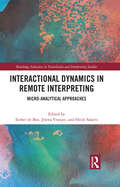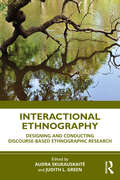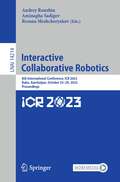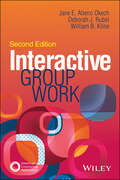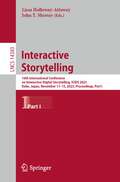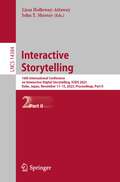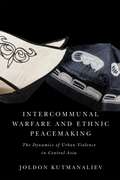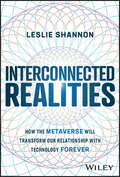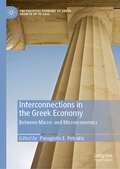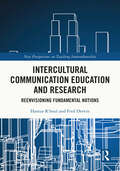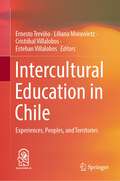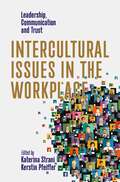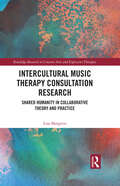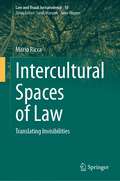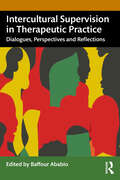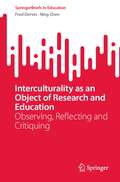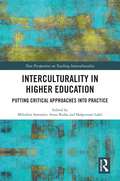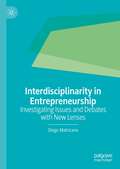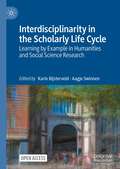- Table View
- List View
Interaction of Nanomaterials With Living Cells
by Faheem Arjamend Sheikh Shafquat Majeed Mushtaq A. BeighThis book examines the interactions of nanomaterials with the biological system. The chapters of the book explore the natural and synthetic biomaterials that modulate immune responses for their applications in drug delivery and tissue engineering. Further, the book discusses the implications of the physiochemical properties of nanoparticles and their microenvironment on their interactions with biological systems. The chapters also present the recognitive capabilities of biomaterials for the development of novel strategies for the detection and treatment of autoimmune disorders. The book also introduces nanotechnology platforms for drug delivery and highlights current and emerging nanotechnologies that could enable novel classes of therapeutics. Towards the end, the book reviews the efficiency of drug-loaded nanoparticles in modulating the functioning of the biological milieu for improved disease treatment. Lastly, the book outlines the ethical issues regarding the use of nanoparticles for in vitro and in vivo applications. Given its scope, it is a valuable resource for graduate students and researchers interested in understanding the biomedical applications of nanoparticles and their interactions with the biological milieu.
Interactional Dynamics in Remote Interpreting: Micro-analytical Approaches (Routledge Advances in Translation and Interpreting Studies)
by Esther Boe Jelena Vranjes Heidi SalaetsThis collection introduces an innovative micro-analytical approach to interaction management in remote interpreting, offering new insights into our understanding of the conversational dynamics of remote dialogue interpreting. The book calls attention to the need for greater reflection on the impact of the increased use of remote interpreting via telephone and video link, particularly in light of the COVID-19 pandemic, on the already complex interactional dynamics of communication in dialogue interpreting settings. Featuring perspectives from both established and emerging scholars, the volume explores both the signals and mechanisms of interaction management and the effects of context in such settings. Chapters draw on empirical studies based on experimental and authentic data from video recordings and eye-tracking data to examine the impact on smoothness and synchronization of the interaction in remote interpreting, in light of the absence of multimodal resources such as gaze and gesture. In collecting this research in a single volume, the book paves the way for further research on the changing relationships between interaction management, technology, and multimodality in dialogue interpreting contexts in today’s increasingly technology-mediated world. This volume will be of interest to students and scholars in interpreting studies, language and communication, and pragmatics.
Interactional Ethnography: Designing and Conducting Discourse-Based Ethnographic Research
by Audra SkukauskaitėFocusing specifically on Interactional Ethnography (IE) as a distinct, discourse-based form of ethnography, this book introduces readers to the logic and practice behind IE and exemplifies the logic of ethnographic inquiry through a range of example-based chapters. Edited by two of the foremost scholars in the field of IE, this book brings together a body of work that has until now been largely dispersed. Illustrating how IE intersects with ethnographic methods – including observation, interviews, and fieldwork – the book highlights considerations relating to data analysis, researcher positionality, and the ethics of engaging participants in research. Offering examples of IE in international contexts and across a range of social science and educational settings, the book provides foundational principles and key examples of IE to guide readers’ work. This book offers researchers, scholars, and teacher educators a definitive, novel contribution to current methodological literature on IE broadly, and will be of particular use to ethnographers starting out in their career. Due to the interdisciplinary nature of the volume in illustrating the use of IE in a range of educational sub-disciplines, the book’s relevance extends to the fields of medical education, teacher education, arts and literacy research, as well as providing situated examples of IE in settings with relevance to the social sciences, anthropology, and cultural studies.
Interactional Ethnography: Designing and Conducting Discourse-Based Ethnographic Research
by Audra SkukauskaitėFocusing specifically on Interactional Ethnography (IE) as a distinct, discourse-based form of ethnography, this book introduces readers to the logic and practice behind IE and exemplifies the logic of ethnographic inquiry through a range of example-based chapters.Edited by two of the foremost scholars in the field of IE, this book brings together a body of work that has until now been largely dispersed. Illustrating how IE intersects with ethnographic methods – including observation, interviews, and fieldwork – the book highlights considerations relating to data analysis, researcher positionality, and the ethics of engaging participants in research. Offering examples of IE in international contexts and across a range of social science and educational settings, the book provides foundational principles and key examples of IE to guide readers’ work.This book offers researchers, scholars, and teacher educators a definitive, novel contribution to current methodological literature on IE broadly, and will be of particular use to ethnographers starting out in their career. Due to the interdisciplinary nature of the volume in illustrating the use of IE in a range of educational sub-disciplines, the book’s relevance extends to the fields of medical education, teacher education, arts and literacy research, as well as providing situated examples of IE in settings with relevance to the social sciences, anthropology, and cultural studies.
Interactions Between Chinese Tax Incentives and WTO’s Subsidy Rules Against the Background of EU State Aid
by Diheng XuThe book provides insights to the alleviation of tensions between Chinese tax incentives and the WTO’s subsidy rules, thus further offering implications for both China and the WTO on integrating in the world economy. Moreover, doing a comparative study with EU State aid law can also provide China with a source of inspiration for reviewing its legal mechanism in respect of tax incentives and the WTO for rethinking its subsidy rules with regard to achieving its objectives and purposes. Academics and students in related subject will be interested to read the book. Practitioners doing business related to China, EU and international trade can be very interested in this book. Policymakers in both China and EU can also get valuable knowledge and inspiration from the book.
Interactive Collaborative Robotics: 8th International Conference, ICR 2023, Baku, Azerbaijan, October 25–29, 2023, Proceedings (Lecture Notes in Computer Science #14214)
by Andrey Ronzhin Aminagha Sadigov Roman MeshcheryakovThis book constitutes the refereed proceedings of the 8th International Conference on Interactive Collaborative Robotics, ICR 2023, held in Baku, Azerbaijan, during October 25–29, 2023.The 33 full papers included in this book were carefully reviewed and selected from 56 submissions. They were organized in topical sections as follows: focused the foundations and means of collaborative behavior of one or more robots physically interacting with hu-mans in operational environments configured with embedded sensor networks and cloud services under uncertainty and environmental variability.
Interactive Group Work
by Jane E. Atieno Okech Deborah J. Rubel William B. KlineA comprehensive and efficient guide for both novice and experienced group leaders, Interactive Group Work helps group leaders to create the conditions across group types and settings that enable group members to support one another. From group work principles to theories and procedures, this text focuses on group counseling and therapy and explores the shared foundations with psychoeducational and task groups. Through in-depth explanations and real-world examples, it illustrates how groups work and builds knowledge of how to create successful group environments—places where group members interact, grow, change, and achieve their goals. This book goes in depth on how to set the stage for group work and enhance the experience for leaders and clients. A supplemental Instructor’s Manual of test questions is available by request from ACA. Requests for digital versions from ACA can be found here. To purchase print copies, please visit the ACA website here Reproduction requests for material from books published by ACA should be directed to permissions@counseling.org
Interactive Storytelling: 16th International Conference on Interactive Digital Storytelling, ICIDS 2023, Kobe, Japan, November 11–15, 2023, Proceedings, Part I (Lecture Notes in Computer Science #14383)
by Lissa Holloway-Attaway John T. MurrayThis two-volume set LNCS 14383 and LNCS 14384 constitutes the refereed proceedings of the 16th International Conference on Interactive Digital Storytelling, ICIDS 2023, held in Kobe, Japan, during November 11–15, 2023. The 30 full papers presented in this book together with 11 short papers were carefully reviewed and selected from 101 submissions. Additionally, the proceedings includes 22 Late Breaking Works. The papers focus on topics such as: theory, history and foundations; social and cultural contexts; tools and systems; interactive narrative design; virtual worlds, performance, games and play; applications and case studies; and late breaking works.
Interactive Storytelling: 16th International Conference on Interactive Digital Storytelling, ICIDS 2023, Kobe, Japan, November 11–15, 2023, Proceedings, Part II (Lecture Notes in Computer Science #14384)
by Lissa Holloway-Attaway John T. MurrayThis two-volume set LNCS 14383 and LNCS 14384 constitutes the refereed proceedings of the 16th International Conference on Interactive Digital Storytelling, ICIDS 2023, held in Kobe, Japan, during November 11–15, 2023.The 30 full papers presented in this book together with 11 short papers were carefully reviewed and selected from 101 submissions. Additionally, the proceedings includes 22 Late Breaking Works.The papers focus on topics such as: theory, history and foundations; social and cultural contexts; tools and systems; interactive narrative design; virtual worlds, performance, games and play; applications and case studies; and late breaking works.
Interaktion zwischen Spezies: Fremdheit und Nähe (Vital Turn: Leib, Körper, Emotionen)
by Anna K.E. SchneiderWie gestalten sich Mensch-Tier-Interaktionen? Anna Schneider nähert sich dieser Frage gestützt auf Theorien des Symbolischen Interaktionismus, der Philosophischen Anthropologie und Leibphänomenologie sowie verschiedenen Empathiekonzepten. Die Autorin erörtert hierfür ausführlich zwei Fallstudien zur Erkundung von Mensch-Tier-Interaktionen im privaten Umfeld (Mensch-Hund) und im institutionellen Rahmen einer Auffangstation (Mensch-Raubkatze). Sie stellt die speziesübergreifende Interaktion als dialektischen Prozess dar, welcher auf verschiedenen Ebenen vollzogen wird und entscheidend von den Faktoren der Annäherung und Abgrenzung zum Anderen geprägt ist. Die komplexe Methodik und hohe Interdisziplinarität der Arbeit verdeutlicht dabei den Bedarf an innovativen Forschungsmethoden für eine inklusive Mensch-Tier-Forschung und bietet einen theoretischen und methodischen Bezugsrahmen für zukünftige Forschung.
Interaktionale Reflexion von professionellem Handeln in der Schulsozialarbeit
by Veronika KnocheDieses Buch beschäftigt sich mit der Frage, wie Schulsozialarbeiter*innen ihr professionelles Handeln im beruflichen Alltag reflektieren. Am Beispiel der bayerischen Jugendsozialarbeit an Schulen (JaS) wird in ethnografischer teilnehmender Beobachtung folgenden Forschungsfragen nachgegangen: Wie gestaltet sich das professionelle Handeln im ausgewählten Handlungsfeld der Jugendsozialarbeit an Schulen? Wie reflektieren Jugendsozialarbeiter*innen an Schulen ihr professionelles Handeln im beruflichen Alltag? Auf welche Veränderungs- und Entwicklungsbedarfe verweisen die Ergebnisse? Welche Rückschlüsse können daraus für die Voraussetzungen und Anforderungen für die JaS in Bayern gezogen werden, sowohl im Hinblick auf das Wissen, das Jugendsozialarbeiter*innen an Schulen für ihr professionelles Handeln benötigen, als auch im Hinblick auf Rahmenbedingungen und die Disziplinbildung? Die Ergebnisse bieten einen ersten Einblick in den bisher verborgen gebliebenen Reflexionsprozess von Schulsozialarbeiter*innen: Die hier entwickelte Grounded Theory der Interaktionalen Reflexion von professionellem Handeln in der Schulsozialarbeit zeigt Reflexionsthemen und -strategien von Schulsozialarbeiter*innen ebenso auf wie die Bedingungen, unter denen diese Reflexionsprozesse stattfinden und ihre Konsequenzen.
Intercommunal Warfare and Ethnic Peacemaking: The Dynamics of Urban Violence in Central Asia (McGill-Queen's Studies in Protest, Power, and Resistance)
by Joldon KutmanalievWith increasing urban population density, conflicts in cities erupt more frequently and violently. Cities have become hotspots for armed combat, highlighting the urgency of understanding the impact of local communities and urban factors on the development of violent conflict. Joldon Kutmanaliev presents a novel approach to analyzing communal violence and armed conflicts in urban zones. Drawing from fieldwork in cities of southern Kyrgyzstan, he explains local-level variations in violence across neighbourhoods during the most intense and violent episode of urban communal violence in Central Asia – the clashes between Kyrgyz and Uzbeks in June 2010. Kutmanaliev explains why armed violence affects some urban neighbourhoods but not others, why local communities react differently to the same existential threat, how they deal with a deteriorating security environment and interethnic fears, and how different types of urban planning and urban landscapes influence the spread of violence. Importantly, the book identifies key factors that help local communities and their leaders to negotiate non-aggression pacts and control local constituencies, and therefore successfully prevent violence.Intercommunal Warfare and Ethnic Peacemaking explains communal war and ethnic peacemaking on the level of neighbourhood communities – a perspective that is largely absent in previous studies.
Interconnect Reliability in Advanced Memory Device Packaging (Springer Series in Reliability Engineering)
by Chong Leong, Gan Chen-Yu, HuangThis book explains mechanical and thermal reliability for modern memory packaging, considering materials, processes, and manufacturing.In the past 40 years, memory packaging processes have evolved enormously. This book discusses the reliability and technical challenges of first-level interconnect materials, packaging processes, advanced specialty reliability testing, and characterization of interconnects. It also examines the reliability of wire bonding, lead-free solder joints such as reliability testing and data analyses, design for reliability in hybrid packaging and HBM packaging, and failure analyses. The specialty of this book is that the materials covered are not only for second-level interconnects, but also for packaging assembly on first-level interconnects and for the semiconductor back-end on 2.5D and 3D memory interconnects. This book can be used as a text for college and graduate students who have the potential to become our future leaders, scientists, and engineers in the electronics and semiconductor industry.
Interconnected Realities: How the Metaverse Will Transform Our Relationship to Technology Forever
by Leslie ShannonExplore how the metaverse is changing our livesIn Interconnected Realities, Leslie Shannon, Head of Trend and Innovation Scouting at Nokia, delivers an energizing and optimistic new take on the Metaverse. Starting with metaverse realms already in existence today, the book explores the purpose that each independent platform serves, as well as how all these disparate realms will ultimately be stitched together to permanently transform our personal and business lives. A singularly insightful and informed exploration of a fascinating subject at the intersection of technology, business, and society, Interconnected Realities is an essential resource for executives, managers, board members, and other business leaders at companies in a wide range of industries, as well as tech enthusiasts, futurists, and anyone with an interest in the future of social interaction, business, or technology.
Interconnections in the Greek Economy: Between Macro- and Microeconomics (The Political Economy of Greek Growth up to 2030)
by Panagiotis E. PetrakisThis book examines the economic interconnections of the Greek economy at a macro and micro level, allowing it to explore both the economic relations between the various sectors and the interconnections of various companies and overlaps in management boards. Two approaches are used to quantify interdisciplinary and cross-sectoral interfaces: the traditional input-output analysis approach and the “influence and information flow” approach through network analysis. The book's first part presents the current conditions and the economic interconnections within the Greek economy. In the second part, during the analysis of microeconomic interconnections between individuals and companies, a much more thorough presentation of the economic interconnections of Greek companies is established. Finally, the book’s third part presents how the Greek economy must transform its production prototype under structural constraints and opportunities for economic diversification and inclusive growth and under the pressure of economic shocks and uncertainty.
Intercultural Communication Education and Research: Reenvisioning Fundamental Notions (New Perspectives on Teaching Interculturality)
by Hamza R'boul Fred DervinSeeking to uncover underlying epistemic invisibilities in generating intercultural communication education and research knowledge and to open up space for envisaging interculturality alternatively, this book reexamines and problematizes the assumptions and ontologies in the conceptual systems of interculturality. In enunciating and critiquing what has been largely endorsed, normalized and taken for granted, this volume brings to the fore different, changing and situated understandings of intercultural ontologies and epistemologies in terms of premises, workings and objectives, unveiling the entangled factors and contexts that have delimited and circumscribed the realm. The authors believe that the field would benefit from some cognitive and sensory dissonance while reengaging effectively with notions to move forward. In particular, they endeavour to de-monumentalize and disrupt the very conceptual tenets that may have rendered interculturality myopic, repetitive, monolithic and aseptic in expanding the epistemic concerns of the “intercultural”, especially in the English language. This book will be an essential read for scholars and students of the sociology of education, educational philosophy and intercultural education and also for all readers interested in the broad field of interculturality.
Intercultural Education in Chile: Experiences, Peoples, and Territories
by Ernesto Treviño Liliana Morawietz Cristóbal Villalobos Esteban VillalobosThis book examines the status of intercultural education in Chile. It does this through three axes: the first is multidisciplinary, including historical, anthropological, sociological, and pedagogical, to account for varied aspects of the Chilean intercultural education. The second is the consideration of multiple indigenous peoples, analyzing students’ groups or indigenous peoples, such as the Rapa Nui, Aymara, or Mapuche. Finally, the book has a multilevel perspective that recognizes that educational policy involves different actors, from the central government to local communities.The book incorporates study material enriched with the experience and analysis of different perspectives and methodologies of its authors, being useful for understanding intercultural education in the country. It is a versatile resource for understanding this topic, as well as a support for the development of programs and policies.Translation from the Spanish language edition: Educación Intercultural en Chile. Experiencias, pueblos y territorios by Ernesto Treviño, et al., © Ediciones UC 2017. Published by Ediciones UC. All Rights Reserved.
Intercultural Issues in the Workplace: Leadership, Communication and Trust
by Katerina Strani Kerstin PfeifferThis textbook addresses key issues and challenges in contemporary multicultural and multilingual workplaces through the lens of leadership, communication and trust. It draws together contributions from fields including cultural studies, psychology, sociolinguistics, translation and interpreting studies, and business management, making a valuable contribution to the area of language and culture in the workplace. The volume is divided into 5 thematic sections: Intercultural Communication; Cross-cultural Leadership; Economy; Language; and Diversity. It offers a critical analysis on themes that tend to be overlooked in intercultural business and management scholarship, such as multilingualism in the workplace, translation and interpreting in cross-cultural work practices, dignity in the workplace, performing gender in the workplace, and D/deaf people in the workplace. It also revisits themes such as cross-cultural leadership, interculturality and the embedded economy, and managing uncertainty in the context of the contemporary globalized workplace. It then brings everything together in a Cross-Cultural Scenarios chapter at the end, with recommendations for every scenario. Overall, the textbook constitutes an essential resource for honours undergraduate and postgraduate students in these and related fields, as well as academics and practitioners with an interest in globalised workplaces.
Intercultural Music Therapy Consultation Research: Shared Humanity in Collaborative Theory and Practice (Routledge Research in Creative Arts and Expressive Therapies)
by Lisa MargettsDrawing on primary research undertaken in a special school in Belarus, this book provides fresh perspectives on supporting the optimisation of relationships between teaching staff and hard-to-reach children with complex needs through learning and experience based in musical interaction, creativity and play. The book explores sustainable approaches to intercultural music therapy consultation research and sets out a practice-based framework to which relationships between researcher and participants, based on mutual respect and trust are central. Findings and implications are discussed from within wider debates regarding cultural diversity in negotiating collaborative partnerships in music therapy research. Featuring case studies and practical examples, the book offers an insightful and informative resource for academics, scholars, and post-graduate students in music therapy and music education. Those working in the arts, psychological therapies, and undertaking teacher training will also benefit from this volume.
Intercultural Spaces of Law: Translating Invisibilities (Law and Visual Jurisprudence #10)
by Mario RiccaThis book proposes an interdisciplinary methodology for developing an intercultural use of law so as to include cultural differences and their protection within legal discourse; this is based on an analysis of the sensory grammar tacitly included in categorizations. This is achieved by combining the theoretical insights provided by legal theory, anthropology and semiotics with a reading of human rights as translational interfaces among the different cultural spaces in which people live. To support this use of human rights’ semantic and normative potential, a specific cultural-geographic view dubbed ‘legal chorology’ is employed. Its primary purpose is to show the extant continuity between categories and spaces of experience, and more specifically between legal meanings and the spatial dimensions of people’s lives. Through the lens of legal chorology and the intercultural, translational use of human rights, the book provides a methodology that shows how to make space and law reciprocally transformative so as to create an inclusive legal grammar that is equidistant from social cultural differences. The analysis includes: a critical view on opportunities for intercultural secularization; the possibility of construing a legal grammar of quotidian life that leads to an inclusive equidistance from differences rather than an unachievable neutrality or an all-encompassing universal legal ontology; an interdisciplinary methodology for legal intercultural translation; a chorological reading of the relationships between human rights protection and lived spaces; and an intercultural and geo-semiotic examination of a series of legal cases and current issues such as indigenous peoples’ rights and the international protection of sacred places.
Intercultural Supervision in Therapeutic Practice: Dialogues, Perspectives and Reflections
by Baffour AbabioIntercultural Supervision in Therapeutic Practice extends the dynamics of intercultural principles beyond the scope of the therapy room to the supervisory relationship. The book spotlights reflections from diverse cultural and "racial" identities and modalities, facilitating critical exchanges and conversations amongst the contributors without the constriction of rank. Trainee and qualified therapists who are not supervisors highlight the radical perspective of their placement supervision experience within intercultural settings and some pitfalls encountered in non-intercultural practice contexts. Chapters by experienced supervisors describe and review interventions, with recommendations for practice. The themes covered include the supervision of trainees within agencies, multi-disciplinary women working with survivors of domestic violence, and the supervision of therapists working with refugees and asylum seekers. At once contemporary and historical, this volume will serve as a reference for inquiring academics, and be of interest to students and clinicians undertaking supervision training, and supervisors and practitioners seeking to offer supervision to multi-disciplinary mental health practitioners.
Interculturality as an Object of Research and Education: Observing, Reflecting and Critiquing (SpringerBriefs in Education)
by Fred Dervin Ning ChenThis book proposes a new method for working on the complex and polysemic notion of interculturality, aimed at scholars, students and educators who have an interest in enriching and challenging their own take on this somewhat controversial scientific notion. Multiple examples of observability made by the authors are provided to illustrate the method. The book helps readers to look at themselves as ‘producers’, ‘consumers’ and ‘promoters’ of selected knowledge of interculturality. This book represents an original contribution to the field, by introducing the importance of observation and reflexivity in building up varied epistemic engagements with the notion of interculturality.
Interculturality in Higher Education: Putting Critical Approaches into Practice (New Perspectives on Teaching Interculturality)
by Sommier MélodineEngaging with the topic of critical intercultural education at tertiary level, the book aims to strengthen what critical intercultural communication means and facilitate its implementation in higher education classrooms. With contributors coming from a variety of educational contexts and disciplines, the book provides a versatile and comprehensive picture of how intercultural communication can be approached in different fields. By offering a reflection on theoretical frameworks for teaching and learning critical intercultural communication, it bridges the gap between theory and practice in recent years. Furthermore, it proposes concrete pedagogical solutions that will help educators working at the tertiary level move from essentialist approaches to meaningful intercultural education. Higher education teachers, lecturers and professors responsible for the design and delivery of teaching on intercultural communication will find this book helpful and resourceful.
Interdisciplinarity in Entrepreneurship: Investigating Issues and Debates with New Lenses
by Diego MatricanoIn response to the increasing move by scholars to reference other fields of knowledge in the advancement of entrepreneurship studies, this book offers an interdisciplinary approach to the study of entrepreneurship.The author investigates five main issues about entrepreneurial processes:the origin of entrepreneurship, the purpose to achieve, the way decisions are made, the creation of entrepreneurial networks and ecosystems. Respectively, these issues are analysed from new perspectives related to other disciplines, such as mythology, philosophy, mathematics, chemistry, and biology. In this way, the book investigates pervading questions about entrepreneurial processes that are still unsolved. By adopting this novel interdisciplinary approach, the book opens up new avenues of research in entrepreneurship studies.
Interdisciplinarity in the Scholarly Life Cycle: Learning by Example in Humanities and Social Science Research
by Karin Bijsterveld Aagje SwinnenThis open access book illustrates how interdisciplinary research develops over the lifetime of a scholar: not in a single project, but as an attitude that trickles down, or spirals up, into research. This book presents how interdisciplinary work has inspired shifts in how the contributors read, value concepts, critically combine methods, cope with knowledge hierarchies, write in style, and collaborate. Drawing on extensive examples from the humanities and social sciences, the editors and chapter authors show how they started, tried to open up, dealt with inconsistencies, had to adapt, and ultimately learned and grew as researchers. The book offers valuable insights into the conditions and complexities present for interdisciplinary research to be successful in an academic setting.This is an open access book.

